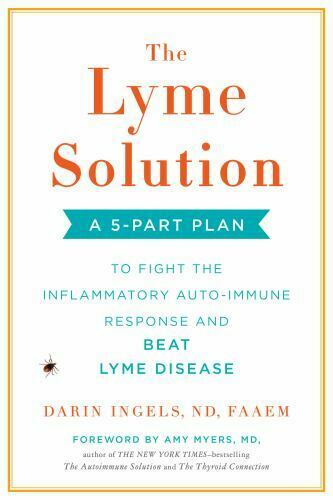We interviewed Darin Ingels ND FAAEM about the use of low-dose naltrexone for Lyme disease and other autoimmune disorders. You can watch the replay below. Please note that you will be asked to enter your email address at the 30-minute mark to continue viewing.
About Low-Dose Naltrexone (LDN)
Medical researchers have discovered that low-dose naltrexone – an older pharmaceutical with very few side effects and a solid safety profile – is helpful for many of the common symptoms that occur in chronic neurological diseases such as Lyme disease, autism, multiple sclerosis and other autoimmune disorders.
These disorders create a lot of oxidative stress and inflammation in the body, which can lead to symptoms such as swelling, stiffness, pain, fatigue, cognition problems, neuropathy, memory problems, fatigue, behavioral issues, allergies and gastrointestinal issues.
Low-dose naltrexone is a unique tool in that it both lowers inflammation and modulates the immune system. Doses are typically given between 0.5 and 6.0mg, which is much less than the 50-100mg doses used for managing alcohol and opiod addiction.
In This Webinar
Dr. Ingels has been one of the pioneers in advocating for the use of low-dose naltrexone in patients with chronic autoimmune and neurological conditions. In this webinar, he’ll help us answer the following questions:
- What is low-dose naltrexone?
- Why is inflammation a common root cause of these conditions?
- How does LDN help lower inflammation?
- How does LDN help improve immune-system function?
- Why is LDN a possible choice for treating these conditions?
- What are other options?
Key Discussions
Integrative and functional approaches to health can often fill gaps left by conventional medicine, especially in the treatment of complex chronic conditions. Dr. Ingels emphasized the body’s innate capacity to heal, along with the importance of identifying and removing obstacles to wellness such as infections, toxins, and stress.
Chronic Lyme Disease Management
Lyme disease can persist beyond the initial infection, requiring a more extended treatment period and a multifaceted approach beyond just antibiotics. Management is personalized and may include diet, lifestyle, and possibly the adjunctive use of low-dose naltrexone (LDN) to improve symptoms and enhance quality of life for sufferers.
The Role of LDN in Autoimmune Conditions
LDN is a promising treatment for various autoimmune and chronic conditions due to its ability to modulate the immune response, striking a balance between TH1 and TH2 pathways, and its potential to alleviate symptoms like pain and immune disruption. It is well-tolerated, affordable, and part of a comprehensive treatment plan alongside lifestyle changes.
The Complexity of Diagnosis and Treatment in Chronic Illness
Autoimmune and chronic conditions like Lyme disease present challenges in diagnosis due to the limitations of current testing methods and the necessity for clinical evaluation. Treatment approaches need to be individualized, considering symptoms and the unique responses of patients to various therapeutic trials, including the use of LDN.
Stress and Its Impact on Chronic Health Conditions
Emotional trauma and stress play a critical role in the exacerbation of chronic health conditions. Addressing stress through techniques such as meditation, acupuncture, or leveraging resources like Heart Math, can be a vital component of a comprehensive treatment plan, emphasizing the need for holistic strategies to manage stress for better health outcomes.
Diet, Lifestyle, and Environmental Factors
Diet and lifestyle are significant contributors to chronic illness, where aspects such as food quality, nutrition, and environmental toxins have substantial impacts on health. Educating patients and the public about these factors, as well as addressing them through organic whole foods and reducing toxins, can lead to improved management and sometimes reversal of chronic health issues.
Timestamped Overview
00:00 Dr. Ingels specializes in treating Lyme disease, autism, and autoimmune disorders.
05:52 Dr. Ingels realized the limits of conventional medicine and turned to naturopathy.
14:24 There are insurance barriers to expensive but effective treatments.
20:17 The body is designed to heal itself.
23:57 Impact of food chemicals on human health.
27:25 Affordable organic options available at various stores.
33:11 Promising medication for various autoimmune conditions.
41:56 Wean off opioids with low-dose naltrexone approach.
44:32 Balancing impact on immune system, no suppression.
51:44 Lyme triggers diverse auto-antibodies, not routinely tested.
56:14 Consider increasing or splitting up doses for effectiveness.
01:00:44 Positive stress exists but can still overwhelm.
01:06:22 Clinical diagnosis based on symptoms and exposure.
01:13:21 Non-prescribing professionals hesitant to use LDN.
01:21:58 Reevaluate benefits, if not felt, stop LDN.
01:26:52 LDN has potential for autoimmune conditions.
About Darin Ingels ND FAAEM
Dr. Ingels is a respected leader in natural medicine with numerous publications, international lectures and 30 years experience in the healthcare field.
He received his Bachelor of Science degree in medical technology from Purdue University and his Doctorate of Naturopathic Medicine from Bastyr University in Seattle, Washington. Dr. Ingels completed his residency at the Bastyr Center for Natural Health.
Dr. Ingels is a licensed Doctor of Naturopathic Medicine in the State of California. He is a Fellow with the American Academy of Environmental Medicine and Fellow with the Medical Academy of Pediatric Special Needs.

Dr. Ingels has been published extensively and is the author of three books, The Natural Pharmacist: Lowering Cholesterol, Natural Treatments for High Cholesterol and The Lyme Solution: A 5-Part Plan To Fight The Inflammatory Autoimmune Response And Beat Lyme Disease. He has also written a chapter on allergy desensitization for autistic children in Cutting Edge Therapies for Autism.
Dr. Ingels’ practice focuses on environmental medicine with special emphasis on Lyme disease, MS, autism, Pediatric Acute-onset Neuropsychiatric Syndrome (PANS and PANDAS) and chronic immune dysfunction, including allergies, asthma, recurrent or persistent infections and other genetic or acquired immune problems.
His practice is comprised of both children and adults. He uses diet, nutrients, herbs, homeopathy, and immunotherapy along with conventional medical therapies to help his patients achieve better health.
You can find out more about him and his practice at dariningelsnd.com
Disclaimer
This webinar is not a substitute for medical advice, treatment, diagnosis, or consultation with a medical professional. It is intended for general informational purposes only and should not be relied on to make determinations related to treatment of a medical condition. Epidemic Answers has not verified and does not guaranty the accuracy of the information provided in this webinar.
Still Looking for Answers?
Visit the Epidemic Answers Practitioner Directory to find a practitioner near you.
Join us inside our online membership community for parents, Healing Together, where you’ll find even more healing resources, expert guidance, and a community to support you every step of your child’s healing journey.
Sources & References
Gironi, M., et al. A pilot trial of low-dose naltrexone in primary progressive multiple sclerosis. Mult Scler. 2008 Sep;14(8):1076-83.
Good, P. Low-dose naltrexone for multiple sclerosis and autism: does its benefit reveal a common cause? Med Hypotheses. 2006;67(3):671-2.
Johnson, B., et al. Fibromyalgia, autism, and opioid addiction as natural and induced disorders of the endogenous opioid hormonal system. Discov Med. 2014 Oct;18(99):209-20.
Kučić, N., et al. Immunometabolic Modulatory Role of Naltrexone in BV-2 Microglia Cells. Int J Mol Sci. 2021 Aug 5;22(16):8429.
Li, Z., et al. Low-dose naltrexone (LDN): A promising treatment in immune-related diseases and cancer therapy. Int Immunopharmacol. 2018 Aug;61:178-184.
Liu, W.M., et al. Naltrexone at low doses upregulates a unique gene expression not seen with normal doses: Implications for its use in cancer therapy. Int J Oncol. 2016 Aug;49(2):793-802.
Metyas, S., et al. Low Dose Naltrexone in the Treatment of Fibromyalgia. Curr Rheumatol Rev. 2018;14(2):177-180.
Mischoulon, J., et al. Randomized, proof-of-concept trial of low dose naltrexone for patients with breakthrough symptoms of major depressive disorder on antidepressants. J Affect Disord. 2017 Jan 15;208:6-14.
Patten, D.K., et al. The Safety and Efficacy of Low-Dose Naltrexone in the Management of Chronic Pain and Inflammation in Multiple Sclerosis, Fibromyalgia, Crohn’s Disease, and Other Chronic Pain Disorders. Pharmacotherapy. 2018 Mar;38(3):382-389.
Rahn, K.A., et al. Prevention and diminished expression of experimental autoimmune encephalomyelitis by low dose naltrexone (LDN) or opioid growth factor (OGF) for an extended period: Therapeutic implications for multiple sclerosis. Brain Res. 2011 Mar 24;1381:243-53.
Tawfik, D.I., et al. Evaluation of therapeutic effect of low dose naltrexone in experimentally-induced Crohn’s disease in rats. Neuropeptides. 2016 Oct;59:39-45.
Younger, J., et al. Fibromyalgia Symptoms are Reduced by Low-Dose Naltrexone: A Pilot Study. Pain Med. May-Jun 2009;10(4):663-72.
Younger, J., et al. The use of low-dose naltrexone (LDN) as a novel anti-inflammatory treatment for chronic pain. Clin Rheumatol. 2014; 33(4): 451–459.
Zagon, I.S., et al. Endogenous opioids regulate expression of experimental autoimmune encephalomyelitis: a new paradigm for the treatment of multiple sclerosis. Exp Biol Med (Maywood). 2009 Nov;234(11):1383-92.
Resources
Books
Elsegood, Linda. The LDN Book: How a Little-Known Generic Drug ― Low Dose Naltrexone ― Could Revolutionize Treatment for Autoimmune Diseases, Cancer, Autism, Depression, and More. Chelsea Green Publishing, 2016.
Elsegood, Linda. The LDN Book, Volume Two: The Latest Research on How Low Dose Naltrexone Could Revolutionize Treatment for PTSD, Pain, IBD, Lyme Disease, Dermatologic Conditions, and More. Chelsea Green Publishing, 2020.
Ingels, Darin. The Lyme Solution: A 5-Part Plan to Fight the Inflammatory Auto-Immune Response and Beat Lyme Disease. Avery, 2019.



